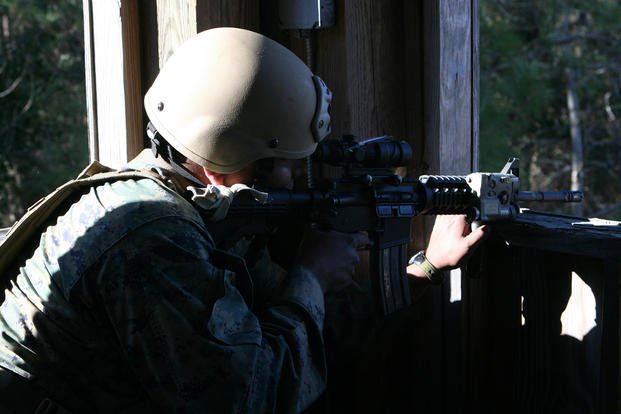MARINE CORPS BASE CAMP LEJEUNE, N.C. -- With the conflict in Afghanistan coming to an end, the role of U.S. Marine Corps Forces, Special Operations Command is being redefined.
Commanding generals from North Carolina met on Stone Bay to meet with staff members of MARSOC, Sept. 13, 2013, to gain a better understanding of the MARSOC mission and how they can complement the bigger Marine Corps mission.
"Everyone thinks there's something mystical about MARSOC that separates us from the Marine Corps," said Maj. Gen. Mark A. Clark, commanding general, MARSOC, during his opening statements during the brief. "There's nothing mystical about it. We're just different."
Recently, members of MARSOC trained with a Marine Expeditionary Unit to test the possibilities of integrating teams on ships.
"We as Marines all came from the sea, even though most of us haven't been on a boat in 12 years," Clark joked. This has been due to the fact that since Sept. 11, 2001, the Marine Corps primarily has focused on deployments to Iraq and Afghanistan.
During a recent exercise, MARSOC Marines were attached to the 11th MEU to test how MARSOC and conventional Marine forces could work together as the conflict in Afghanistan comes to a close.
The Special Operation Forces Liaison Elements will help collaborate special operation efforts and conventional forces' efforts to achieve overall mission success from both sides. Though the initial test showed some success, some things still need to be worked on.
"The key is the relationship between MARFOR [Marine Forces] and MARSOC units," said Maj. Gen. Raymond Fox, commanding general, II Marine Expeditionary Force, during the symposium. "We will ultimately be working in the same AO [area of operations]. But we need to keep in mind the challenging command structure of the MEU and where MARSOC will fall in with them."
With the Afghanistan mission closing, each of the Marine Special Operations Battalions will be aligned regionally to a theater of operations in the Pacific Command, Central Command or Africa Command.
With assignment to each theater of operation, training for critical skills operators will draw on the area in which they are assigned and will include more advanced language training and cultural awareness for each region.
As the Marine Corps begins to draw down its forces, MARSOC is continually trying to build upon its numbers. The need for critical skills operators and special operations capabilities specialists are in high demand to ensure the success of the MARSOC mission.
Want to Know More About the Military?
Be sure to get the latest news about the U.S. military, as well as critical info about how to join and all the benefits of service. Subscribe to Military.com and receive customized updates delivered straight to your inbox.











